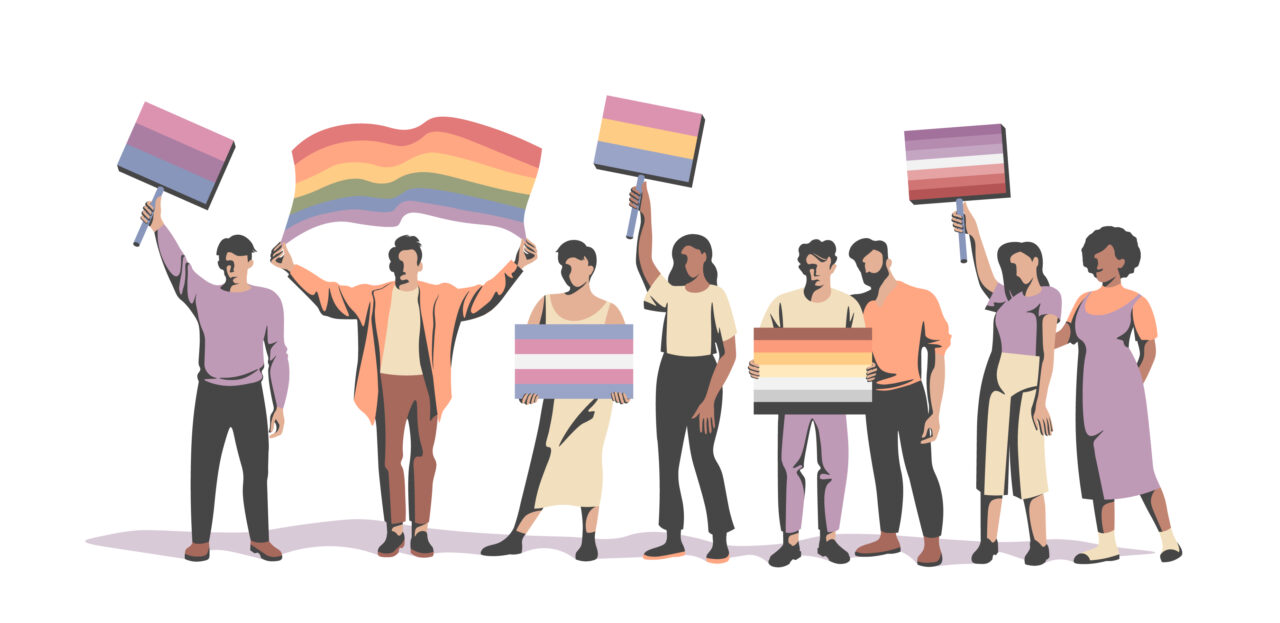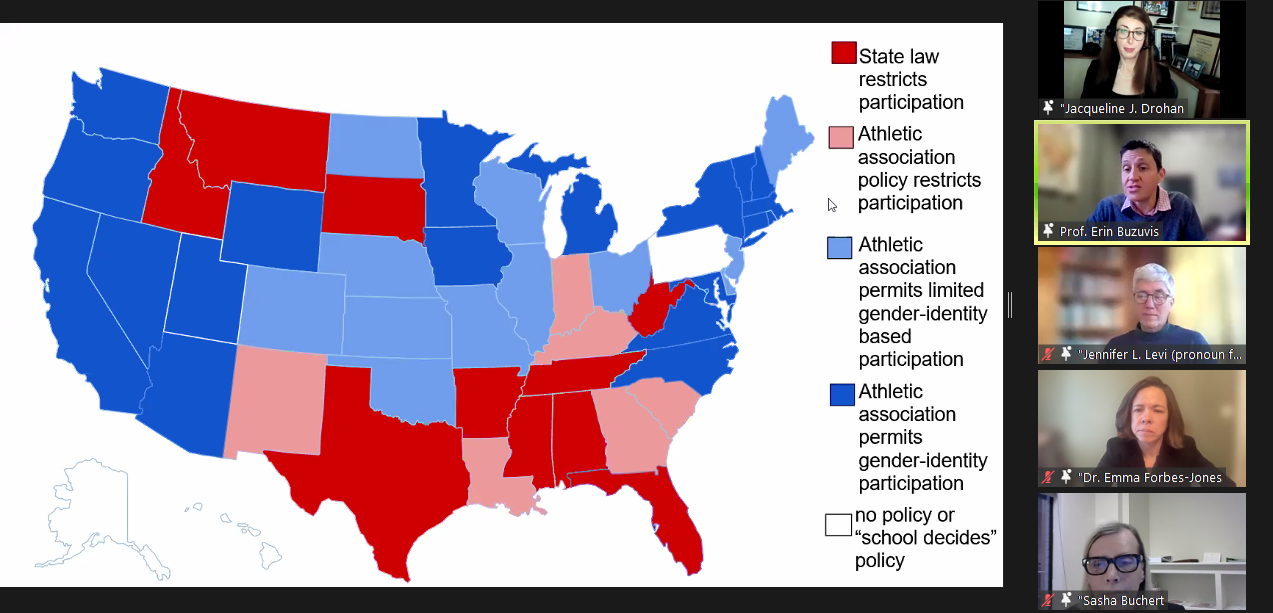Transgender Youth in Sports: Questions Remain Unresolved
12.6.2021
Over the past two years, more than 30 states have considered or passed legislation restricting the rights of transgender and gender-expansive youth to participate in scholastic athletics. For example, H.B.500 was signed by Idaho’s governor in March 2020 implementing a categorical ban on transgender athletes from participation in sports at the high school and college level. The law is currently under injunction by a federal court, noting in its ruling the “compelling evidence that equality in sports is not jeopardized” by permitting transgender women to compete on women’s teams.
In November 2021, civil rights organizations filed a federal lawsuit on behalf of a transgender boy prevented by Tennessee law from participating in his high school boys’ golf team. The action, L.E v. Tennessee, opposes Tennessee state law S.B. 228, which restricts the rights of transgender and gender-expansive students. It requires that, for purposes of sports participation, a middle or high school student’s gender be assessed as the student’s sex assigned at birth as indicated on the student’s birth certificate. The bill passed in March and was signed into law by Governor Bill Lee. The suit, filed by Lambda Legal and the ACLU, alleges that the Tennessee law had little to do with protection of girls in sports but was in fact “part of a wave of legislation in Tennessee and across the country targeting transgender people for disapproval and exclusion from full participation in society.”[1] Unlike the more limited success of prior similar efforts to restrict the rights of transgender persons to use public bathrooms, these state sports bills have shown significant traction, at least at the legislative level. To date, bills have been approved or signed by governors including those of Alabama, Arkansas, Mississippi, Montana, Tennessee, Texas and West Virginia.
Many of these laws are now before state, district and U.S. appellate courts as violative of the anti-discrimination protections of Title IX of the U.S. Civil Rights Act of 1964.[2] Contrary challenges have also been brought under Title IX opposing the inclusion of transgender athletes in school sports in states with permissive policies. These include the Connecticut case of Soule v. CIAC,[3] currently on appeal to the 2nd Circuit. Connecticut’s position in the case is supported by an amicus brief filed by New York Attorney General Letitia James.
NYSBA earlier this year created its Task Force on the Treatment of Transgender Youth in Sports to study and make recommendations to its House of Delegates regarding the unprecedented number of laws that have been proposed and introduced at both the federal and state level to ban, criminalize and otherwise severely limit transgender youth from participating in school sports, targeting primarily children in kindergarten through grade 12 schools.
NYSBA has a history of advocating for child welfare and inclusion and equality for all girls, women and LGBTQ+ persons (especially those of color). For example, this past year, NYSBA filed an amicus brief in the case of Fulton v. City of Philadelphia[4] before the U.S. Supreme Court in support of the rights of same-sex couples to provide foster child care.
Recently, NYSBA joined more than 600 national associations in putting forward its public support for H.R. 5 – the Equality Act – which would explicitly extend the ban contained in Title IX of the Civil Rights Act of 1964 to discrimination based on sexual orientation or gender identity and clarify the alignment of federal law with the position of the U.S. Supreme Court set out last year in Bostock v. Clayton County, GA.[5] Bostock remains vulnerable given the current conservative composition of the Court.
New York State and City Policies
New York State, as well as local schools and athletic associations in many states,[6] already have guidelines of varying effectiveness intended to protect the civil rights of transgender students while ensuring a level playing field for all athletes. The NYSBA Task Force has noted that these policies, including those across New York State, have resulted in no harm to the welfare of cisgender girls or women or any competitive disadvantage in girls’ or women’s sports. On the contrary, where these policies are lacking, distinct and well-documented harm is caused to transgender, gender non-conforming and intersex youth, a population of children already at a severely elevated risk of social exclusion, educational failure, violence and self-harm.[7]
Guidelines enacted by the New York State Public High School Athletic Association recommend that students wishing to participate in sports notify the superintendent and athletic director of the district if their gender identity does not conform with the sex listed on their birth certificate. The school is advised to use such gender identity for school registration and other purposes, including medical documentation and in determining a student’s eligibility for sports participation. It should be carefully noted that these are only guidelines; New York state public schools are not legally mandated by the guidelines to permit athletic participation based upon gender identity, and compliance varies regionally across the state.
New York City’s Department of Education has also issued a statement on discrimination and harassment which comprises protections for gender identity and expression. The statement calls generally for an inclusive policy, with case-by-case review for competitive and contact sports. It puts forth that “[t]ransgender students are to be provided the same opportunities to participate in physical education as are all other students. Generally, students should be permitted to participate in physical education and sports in accordance with the student’s gender identity that is consistently asserted at school. Participation in competitive athletic activities and contact sports will be resolved on a case-by-case basis.”[8] As with the state guidelines, the statement does not require schools to permit students to use facilities or participate in sports programs in accordance with their gender identity.
Some measure of legal “teeth” behind these policy guidelines may be manifesting in New York under the 2019 Gender Expression Non-Discrimination Act (GENDA). An amendment to the New York State Human Rights Law, GENDA explicitly added gender identity or expression as a protected category. The plain language of the law prohibits discrimination on the basis of gender identity or expression in all areas covered by the Human Rights Law, including employment, housing, places of public accommodation and non-religious schools. What practical protection this may extend to the experience of transgender youth in school sports is evolving, but the law’s language would appear to stand against intrusive sex testing, barring “equal access” from “public accommodations,” and school facilities, presumably including public school locker rooms.
Federal Legislative Efforts
Title IX of the U.S. Civil Rights Act has been the primary battleground for both sides of the issue, and New York’s friendly guidelines and supportive legislation could easily be preempted should exclusion of transgender participants be reframed as a federal civil right vested in cis-gender women athletes. Rep. Tulsi Gabbard, D-Hawaii, introduced the “Protect Women’s Sports Act” into the U.S. House of Representatives in December of 2020, co-sponsored by a Republican representative. Gabbard stated that the proposed bill “protects Title IX’s original intent” by preempting laws in “states who are misinterpreting Title IX, creating uncertainty, undue hardship and lost opportunities for female athletes” by allowing males to “dominate and displace” them.[9] It should be noted that with over two decades of data, there is absolutely no evidence that transwoman athletes have or are ever likely to “dominate” women’s sports at the scholastic or adult levels.[10] Similar legislation was introduced earlier in 2020 in the Senate. The Protection of Women and Girls in Sports Act of 2020 would amend the definition of sex in Title IX of the Education Amendments of 1972 to exclude gender identity and provide that any state school which “operates, sponsors, or facilitates athletic programs or activities” found in violation of its redefined Title IX will be stripped of federal funding. The bill was sponsored by Georgia Senator Kelly Loeffler and co-sponsored by fellow Senate conservatives like Utah’s Mike Lee, Tennessee’s Marsha Blackburn and Arkansas’ Tom Cotton, all of whom have a notable anti-LGBTQ legislative record. The bill remains in committee.
Contrary efforts to shore up Title IX to explicitly clarify its protection against attacks on civil rights based on gender identity appear to have greater support. The Equality Act would clarify the alignment of federal law with the position of the U.S. Supreme Court set out last year in Bostock v. Clayton County, GA, a definitional ruling which held that the term “sex” is inclusive, for federal civil rights purposes, of gender identity and sexual orientation. President Biden issued an executive order in March of 2021 effectively enacting the Bostock ruling in federal employment and federally regulated areas.[11]
The issue of transgender youth in sports has a potentially much broader impact upon the future of civil rights at the federal level. Alleged concerns about the impact of inclusion of transgender youth upon fair competition and safety for cisgender girls in school sports have been weaponized by opponents of the Equality Act, as well as proponents of the competing conservative efforts to excise protections for LGBTQ Americans from the Civil Rights Act altogether. For this and other reasons, states like New York, despite their own relatively permissive policy profile, cannot afford to ignore the debate, and for this reason alone, NYSBSA should weigh in.
Conclusion
The right of transgender and gender-expansive students to participate fully in youth sports on the basis of their gender identity remains an active legal and political dispute, both federally and at the state level. This includes states with generally permissive guidelines such as New York. NYSBA’s Task Force on the Treatment of Transgender Youth in Sports will host a CLE panel on the topic at NYSBA’s Presidential Summit on January 19, 2022. Those with interest are encouraged to attend.
Jacqueline J. Drohan is a partner with Drohan Lee. Her practice includes securities, commodities and derivatives litigation. Before that, she was a senior capital markets dealer for banks including First Chicago International and Deutsche Bank. Drohan has been a frequent speaker at legal, financial industry and academic conferences, and has published articles on financial economics, federal civil procedure, governmental ethics in enforcement and commodities regulation. She is chair of the Task Force on the Treatment of Transgender Youth in Sports.
[1] As quoted in M. Tyler Gillet, Civil Rights Groups File Lawsuit Against Tennessee Transgender Sports Ban, Jurist, Nov. 6, 2021, https://www.jurist.org/news/2021/11/civil-rights-groups-file-lawsuit-against-tennessee-transgender-sports-ban.
[2] See, e.g., Hecox v. Little, 479 F. Supp. 3d 930 (Idaho Dist. Ct. 2020); B.P.J. v. West Virginia, No. 2:21-cv-00316 (S.D. W.Va. July 21, 2021).
[3] No. 20CV0021 (D. Ct. Apr. 25, 2021).
[4] 141 S. Ct. 1868 (2021).
[5] 140 S. Ct. 1731 (2020).
[6] See Survey of state law and policy in TRANSATHLETE: High school transgender athlete policies. https://www.transathlete.com/k-12.
[7] Fair Play – Center for American Progress. See also Erin Buzuvis, Transgender Student-Athletes and Sex-Segregated Sport: Developing Policies of Inclusion for Intercollegiate and Interscholastic Athletes, Seton Hall J. Sports & Ent. Law 21:1 (2011).
[8] NYC’s Department of Education Guidelines to Support Transgender and Gender Expansive Students, https://www.schools.nyc.gov/school-life/school-environment/guidelines-on-gender/guidelines-to-support-transgender-and-gender-expansive-students.
[9] Tulsi Gabbard Stands Up for Women’s Sports, National Review, Dec. 19, 2020, https://www.nationalreview.com/2020/12/tulsi-gabbard-stands-up-for-womens-sports.
[10] See, e.g. National Collegiate Athletic Ass’n, NCAA Inclusion of Transgender Student-Athletes 13 (Aug. 2011) Available at https://www.transathlete.com/policies-college.
[11] Executive Order 14021 on Guaranteeing an Educational Environment Free from Discrimination on the Basis of Sex, Including Sexual Orientation or Gender Identity (Mar. 11, 2021), https://www.govinfo.gov/content/pkg/FR-2021-03-11/pdf/2021-05200.pdf.






